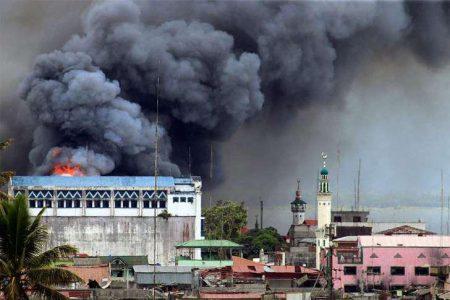
Indonesia must rise to the challenge of countering ISIS
There are few incidents as horrifying as the involvement of children in suicide bombings. On May 13, 2018, a family of six that included an eight-year-old girl carried out coordinated ISIS-inspired suicide bombings that struck three churches in Surabaya, the second-largest city in Indonesia, leaving 15 bystanders dead and dozens injured. Later that evening, the father of another family of six in one of the city’s suburbs prematurely detonated a bomb they were planning to use in the future, leading security forces to rush to the scene of the explosion to find his wife and his oldest daughter killed. The father, injured but reportedly still holding the detonator, was shot dead, while the family’s 12-year-old son brought his two younger sisters to a local hospital for treatment. And in less than 24 hours, a family of five bombed the city’s police headquarters, resulting in 10 people being wounded and all but the youngest member of the family, a seven-year-old girl, dying from the blasts.
The Surabaya bombings are the deadliest terrorist attacks that Indonesia has suffered from since the 2002 Bali bombings, and it marks the first time in the country’s history where children were implicated in domestic terror incidents.
As Indonesia reeled from the series of tragedies that unfolded in May, Jakarta has been swift to push through revisions of the prevailing 2003 national anti-terrorism law after years of its protracted deliberation in the Indonesian parliament. On May 25, 2018, the House of Representatives passed a stronger anti-terrorism bill that stipulates the police can preemptively detain terror suspects for up to 21 days without charge and detain them further for up to 200 days as investigators gather evidence for state prosecution. Under the revised law, there is also now a legal basis to prosecute those who return from foreign countries if they are proven to have joined extremist groups or participated in militant activities overseas. And perhaps most controversially, the bill has granted the Indonesian National Armed Forces a greater role in counterterrorism efforts by changing the law’s definition of what constitutes terrorism to include the phrase, “intention to disrupt security”.
Indonesia’s new anti-terror legislation comes at a time where Southeast Asia has been struck by increasing levels of militancy and terrorism in recent years. The most notable example of the rise of transnational terrorism in the region is arguably the Battle of Marawi in 2017. From May 23 to October 23, the Philippine Armed Forces fought against hundreds of militants backed by ISIS to regain government control of the city of Marawi. The battle became the longest urban conflict that the Philippines has faced in its modern history, and vast sections of the city were obliterated from the five-month-long siege.
Terrorism in Southeast Asia is not a new phenomenon. The 2002 Bali bombings that killed 202 people were perpetrated by members of Jemaah Islamiyah, a local terrorist group with linkages to Al-Qaeda, and subsequent terrorist attacks that followed afterwards such as the 2004 Super Ferry 14 bombing in the Philippines, the 2009 hotel bombings in Jakarta, and the 2015 Bangkok bombing all inflicted heavy civilian casualties throughout the region.
The nature and scale of terrorist incidents in Southeast Asia since 2016 indicates, however, that ISIS has established a prominent ideological and physical foothold in the region. Indeed, a UN Security Council report published in January 2017 stated that ISIS is increasingly looking to Southeast Asia as a new theatre of operations, “seeking to intensify its recruitment and appeal to its sympathizers in South-East Asia” while simultaneously reaching out to local terrorist groups in the region on matters of planning, coordination, and finance for terror attacks. Ramakrishna, a security expert on Southeast Asia, provides an explanation for this shift in operational focus by arguing that the decline of ISIS’s Caliphate in the Middle East has “prompted its leadership to seek other relatively poorly governed and restive zones” in order to establish “alternative fallback positions” in the event that the Caliphate collapses – which it did in the Fall of 2017. Singh, writing for The Diplomat, similarly attributes the issue of a “conveyor belt of [Southeast Asian] ISIS returnees coming to roost at home” after fighting in Syria and Iraq as one of the prime reasons why the region faces growing security threats related to ISIS.
The blurring of national and global security when it comes to transnational terrorist threats like ISIS calls for more multilateral engagement and advancements in regional cooperation by ASEAN states. Jakarta has taken significant steps in this regard with its proposal of a new regional intelligence-sharing pact called the “Our Eyes” initiative, which was officially launched on January 25, 2018 with five other ASEAN states. Strengthening national and regional counterterrorism efforts against ISIS in Southeast Asia, however, will also require individual ASEAN members to step up to the task of becoming leaders in the global war against terror – to be at its forefront and not at its sidelines. Fortunately, Indonesia’s recent decisive win in obtaining a seat at the UN Security Council positions Jakarta in a favourable position to do just that.
It will no doubt be a heavy responsibility to shoulder, and only time will tell as to how well Indonesia will be able to utilize its new international prestige and voting power. But if Jakarta can effectively voice its concerns at the UN on the increasing threat posed by ISIS in Southeast Asia and put forward comprehensive approaches aimed at combating their rise, Indonesia may be the leading representative that ASEAN desperately needs to push the global community to work together to stem the tide of terror in the region.
Source: chargedaffairs





